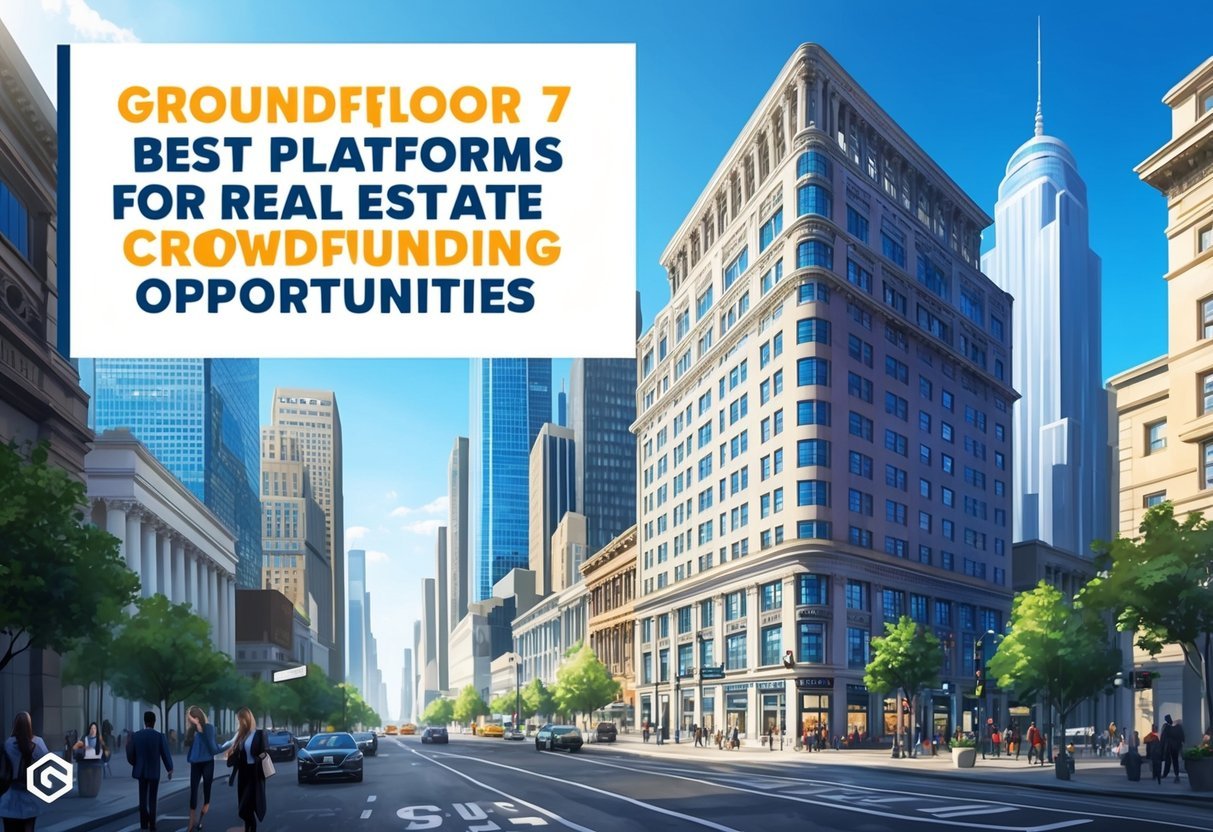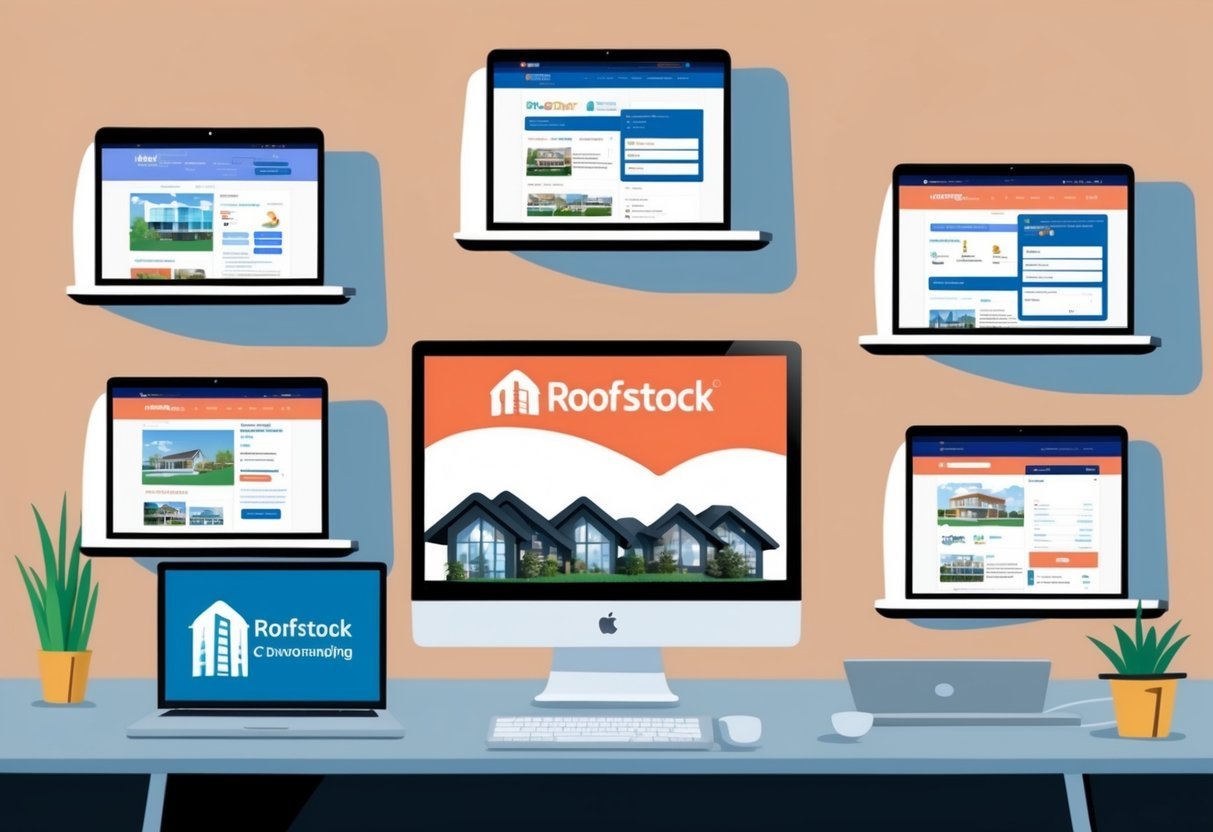Real estate crowdfunding has revolutionized the way individuals can invest in property markets.
This innovative approach allows you to diversify your portfolio and potentially earn attractive returns without the need for significant capital or hands-on property management.

By choosing the right platform, you can access a wide range of real estate investment opportunities tailored to your financial goals and risk tolerance. These platforms offer various options, from commercial properties to residential developments, enabling you to participate in projects that were once reserved for large institutional investors.
As you explore the world of real estate crowdfunding, it’s crucial to understand the features and benefits each platform provides to make informed investment decisions.
1) Fundrise
Fundrise stands out as a popular choice for real estate crowdfunding.
You can start investing with as little as $10, making it accessible for beginners.
The platform offers a variety of investment options, including eREITs and eFunds.
Fundrise has a user-friendly interface that simplifies the investment process.
The platform provides diversification across multiple properties and geographic locations, helping to spread your risk.
Fundrise boasts solid historical returns for investors.
You can choose from different investment strategies based on your goals, such as supplemental income or long-term growth.
One of Fundrise’s strengths is its transparency.
You can easily track your investments and view detailed information about the properties in your portfolio.
The platform also offers automatic reinvestment of dividends, allowing for potential compound growth.
Keep in mind that real estate investments are generally illiquid.
Fundrise does offer redemption options, but there may be fees or waiting periods involved.
You should consider your investment timeline before committing funds.
Fundrise provides educational resources to help you understand real estate investing.
This can be particularly valuable if you’re new to the field.
As with any investment, it’s crucial to research and understand the risks involved before getting started.
2) RealtyMogul
RealtyMogul stands out as a prominent real estate crowdfunding platform that caters to both accredited and non-accredited investors.
You can access various investment opportunities through their user-friendly online dashboard.
The platform offers two main investment options: REITs (Real Estate Investment Trusts) and individual properties.
REITs provide a lower entry point, making them suitable for beginners or those with limited capital.
For more experienced investors, RealtyMogul presents opportunities to invest in specific properties.
These may include commercial real estate, multifamily buildings, and other income-generating assets.
You’ll appreciate the platform’s due diligence process.
RealtyMogul thoroughly vets each investment opportunity before presenting it to investors, potentially reducing your risk exposure.
The minimum investment varies depending on the specific opportunity.
For REITs, you can start with as little as $5,000, while individual property investments may require higher amounts.
RealtyMogul provides detailed information about each investment, including projected returns, property details, and market analysis.
This transparency helps you make informed decisions about your real estate investments.
Keep in mind that real estate crowdfunding involves risks.
While RealtyMogul offers potential for passive income and portfolio diversification, it’s crucial to carefully evaluate each opportunity and consider your financial goals before investing.
3) Yieldstreet

Yieldstreet offers a unique approach to real estate crowdfunding.
You can access a variety of investment opportunities beyond just real estate, including art, private credit, and more.
The platform caters to both accredited and non-accredited investors.
This inclusivity allows you to explore diverse investment options regardless of your financial status.
Yieldstreet’s minimum investment typically starts at $10,000.
While this may seem high, it provides you with access to institutional-quality investments that were previously out of reach for individual investors.
You’ll find that Yieldstreet focuses on short-term investments, often with durations of 1-3 years.
This can be advantageous if you’re looking for quicker returns on your investment.
The platform offers both debt and equity investments in real estate.
This allows you to choose strategies that align with your risk tolerance and investment goals.
Yieldstreet’s user interface is intuitive and easy to navigate.
You can quickly review potential investments and make informed decisions based on detailed property information and market analysis.
Keep in mind that many of Yieldstreet’s offerings are illiquid.
This means you may not be able to sell your investment before the term ends, so careful consideration of your financial needs is crucial.
4) PeerStreet

PeerStreet offers you a unique opportunity to invest in private real estate loans.
This platform specializes in short-term, high-yield debt investments backed by real estate.
When you choose PeerStreet, you’ll have access to a diverse range of loan types, including residential, multifamily, and commercial properties.
This variety allows you to spread your investment across different real estate sectors.
One of PeerStreet’s standout features is its automated investing tool.
You can set your investment criteria, and the platform will automatically allocate your funds to loans that match your preferences.
This saves you time and ensures your money is always working for you.
The minimum investment on PeerStreet is $1,000 per loan, making it accessible for many investors.
However, keep in mind that you must be an accredited investor to participate.
PeerStreet thoroughly vets each loan before offering it on the platform.
They analyze the borrower’s creditworthiness, the property’s value, and the loan-to-value ratio.
This due diligence helps mitigate risk and protect your investment.
The platform offers loan terms typically ranging from 6 to 24 months.
This shorter duration allows you to reassess your investment strategy more frequently and potentially take advantage of changing market conditions.
Remember that while real estate debt investments can offer attractive returns, they also come with risks.
It’s crucial to diversify your portfolio and only invest what you can afford to lose.
5) Groundfloor

Groundfloor offers a unique approach to real estate crowdfunding.
This platform allows you to invest in short-term residential real estate loans with as little as $10.
You can choose from a variety of projects, each with different risk levels and potential returns.
This flexibility enables you to diversify your portfolio according to your risk tolerance and investment goals.
Groundfloor is open to both accredited and non-accredited investors.
This inclusivity makes it an attractive option if you’re just starting your real estate investment journey.
The platform provides detailed information about each loan, including property photos, borrower details, and risk ratings.
This transparency helps you make informed decisions about where to allocate your funds.
You’ll find that Groundfloor offers a self-directed IRA option.
This feature allows you to invest in real estate loans using retirement funds, potentially offering tax advantages.
One of Groundfloor’s standout features is its secondary market.
Here, you can buy or sell loan positions before they reach maturity, providing additional liquidity to your investments.
Remember to consider the risks associated with real estate lending.
While Groundfloor vets borrowers and properties, there’s always a possibility of default or project delays.
6) Roofstock

Roofstock stands out as a unique player in the real estate crowdfunding arena.
This platform specializes in single-family rental properties, offering you a distinctive investment opportunity.
When you invest through Roofstock, you’re not just putting money into a fund.
You’re gaining access to specific rental homes that generate regular income.
The platform provides extensive property details, including inspection reports and financial projections.
This information empowers you to make informed decisions about potential investments.
Roofstock offers a turnkey solution for property management.
You can choose to have your investment overseen by their network of professional managers, simplifying the landlord experience.
One of the advantages of Roofstock is its accessibility.
You don’t need to be an accredited investor to participate, opening up real estate investing to a broader audience.
The platform also offers a unique feature called Roofstock One.
This option allows you to purchase fractional shares of rental properties, lowering the entry barrier even further.
Roofstock provides educational resources to help you understand the nuances of single-family rental investments.
These tools can be valuable for both novice and experienced investors.
Remember that while single-family rentals can offer steady income, they may be more susceptible to individual tenant issues than larger multi-unit properties.
Consider this factor when diversifying your real estate portfolio.
7) EquityMultiple

EquityMultiple stands out as a premier real estate crowdfunding platform for accredited investors.
You can access a variety of commercial real estate opportunities through this platform.
The minimum investment with EquityMultiple typically starts at $5,000, making it accessible for those looking to diversify their portfolio.
You’ll find a range of investment options, including equity, preferred equity, and debt investments.
EquityMultiple’s team carefully vets each investment opportunity before presenting it to investors.
This rigorous due diligence process helps mitigate risk and ensures you’re presented with high-quality opportunities.
You can expect detailed information on each investment, including property specifics, market analysis, and projected returns.
This transparency allows you to make informed decisions about where to allocate your funds.
The platform offers a user-friendly interface, making it easy for you to track your investments and monitor performance.
You’ll receive regular updates on your holdings, keeping you informed about the progress of your real estate investments.
EquityMultiple’s focus on commercial real estate provides you with exposure to potentially lucrative sectors such as multifamily properties, office buildings, and retail spaces.
This diversification can help balance your investment portfolio and potentially enhance your returns.
What Is Real Estate Crowdfunding?
Real estate crowdfunding allows you to pool your money with other investors to finance property projects.
This innovative approach democratizes access to real estate investments, previously limited to wealthy individuals or institutions.
Through online platforms, you can invest in various property types, from residential developments to commercial properties.
Real estate crowdfunding platforms connect developers seeking capital with investors looking for opportunities.
You can often start with smaller amounts, sometimes as low as $1,000, making it accessible to a broader range of investors.
How Real Estate Crowdfunding Works
When you engage in real estate crowdfunding, you typically choose from two main investment types: equity or debt.
Equity investments give you partial ownership in the property, while debt investments involve lending money to the project.
The process usually involves:
-
Selecting a platform
-
Creating an account
-
Reviewing available projects
-
Choosing an investment
-
Transferring funds
Many platforms offer both debt and equity opportunities, catering to different risk appetites and investment goals.
You’ll receive regular updates on your investment’s progress and can often track performance through an online dashboard.
Benefits of Real Estate Crowdfunding

Real estate crowdfunding offers several advantages for investors looking to diversify their portfolios and access lucrative property markets.
This innovative approach provides unique opportunities for both novice and experienced investors.
Diversification
You can spread your investment across multiple properties and locations with real estate crowdfunding.
This diversification helps mitigate risk and potentially stabilize returns.
By investing smaller amounts in various projects, you’re not putting all your eggs in one basket.
This strategy can protect your portfolio from localized market downturns or individual property underperformance.
Real estate crowdfunding platforms often offer a range of property types, including residential, commercial, and industrial.
This variety allows you to invest in different sectors of the real estate market, further enhancing your diversification strategy.
Accessibility to Investors
Real estate crowdfunding has lowered the barriers to entry for property investment.
Previously, substantial capital was required to invest in real estate, but now you can start with much smaller amounts.
Many platforms allow investments starting from as low as $10 to $500, making real estate accessible to a broader range of investors.
This democratization of real estate investing opens up opportunities that were once reserved for wealthy individuals or institutional investors.
You can now participate in large-scale commercial projects that were previously out of reach for individual investors.
This access to institutional-quality investments can potentially enhance your portfolio’s performance.
Potential for High Returns
Real estate crowdfunding can offer attractive returns compared to traditional investment options.
While returns vary based on the specific project and market conditions, many platforms report historical returns ranging from 8% to 12% annually.
Some platforms focus on value-add projects or development deals, which can yield even higher returns.
These opportunities often involve renovating or repositioning properties to increase their value and rental income.
You may also benefit from both regular income streams and capital appreciation.
Many crowdfunded real estate investments provide quarterly distributions from rental income, while also aiming for property value appreciation over time.
Assessing Risks in Real Estate Crowdfunding

Real estate crowdfunding involves several potential pitfalls that investors should carefully consider.
Understanding these risks can help you make more informed decisions and protect your investment.
Market and Economic Factors
Property values and rental income can fluctuate based on local and national economic conditions.
You should research the specific market where the property is located, including job growth, population trends, and development plans.
Interest rates play a crucial role in real estate investments.
Rising rates can increase borrowing costs and potentially decrease property values.
Keep an eye on economic indicators and Federal Reserve policies that might impact interest rates.
Real estate crowdfunding platforms often focus on specific property types or regions.
Diversifying across different projects can help mitigate risks associated with market fluctuations in a particular area or sector.
Property Management Issues
The success of your investment often depends on effective property management.
Poor management can lead to higher vacancy rates, increased maintenance costs, and lower returns.
Research the track record of the property management team associated with the crowdfunding project.
Look for:
- Experience in similar properties
- Tenant satisfaction rates
- Maintenance and repair strategies
- Financial management skills
Be aware that unexpected repairs or renovations can eat into your returns.
Ensure the crowdfunding platform provides clear information about contingency funds and how unforeseen expenses are handled.
Liquidity Concerns
Real estate crowdfunding investments are typically less liquid than stocks or bonds.
You may be unable to sell your investment quickly if you need cash.
Many platforms have lock-up periods during which you cannot withdraw your funds.
These can range from a few months to several years.
Understand these terms before investing.
Some platforms offer secondary markets where you can sell your investment to other users.
However, these markets may have limited buyers, potentially affecting the price you can get for your shares.
What are the risks associated with real estate crowdfunding for beginners?
Real estate crowdfunding carries risks, just like any other investment.
These include potential loss of capital, lack of liquidity, and market fluctuations.
New investors should be aware of platform-specific risks, such as project failures or platform insolvency.
It’s crucial to thoroughly research and understand each investment opportunity before committing funds.

